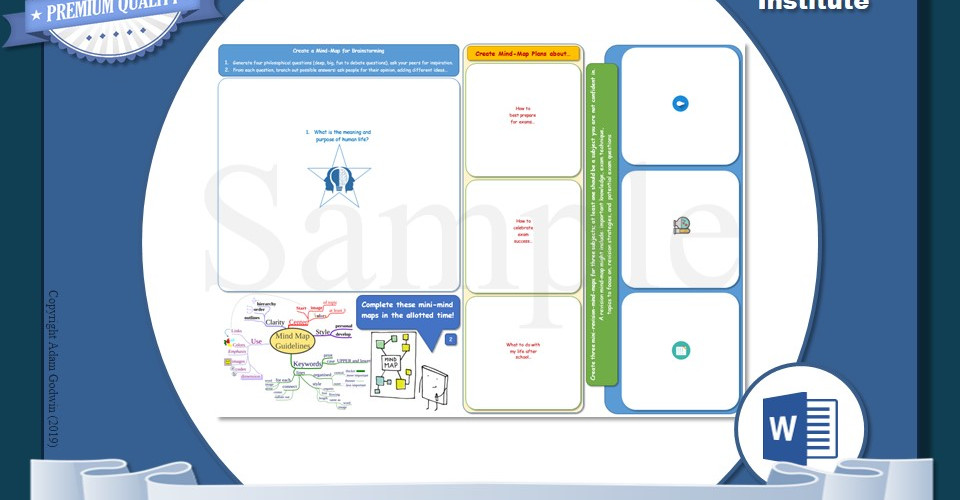This articles explores the importance of skills and abilities that can be learned and practised with a view to boosting overall learning-power. We will look at three categories of skills: metacognitive skills, self-regulated learning skills, and the much broader category of learning-skills.
What's the Difference?
· Metacognitive skills are skills and abilities that underpin or assist with metacognition (monitoring, evaluating and regulating the cognitive aspect of learning-processes)
· Self-regulated learning skills are broader category of skills and abilities that underpin or assist with self-regulated learning (which may include, for the example, the monitoring and regulation of emotion, behaviour and lifestyle). Metacognitive skills come under the umbrella of self-regulated learning skills.
· Learning-skills (also known as study-skills) are a much broader category still; they are skills and abilities that underpin learning, enhance learning or boost overall learning-power. Both self-regulated learning skills and, therefore, metacognitive skills, come under the umbrella of learning-skills.
As we shall see, there is some overlap in these categories. One of the take home messages of this article should be that metacognition & self-regulated learning can involve teaching students about learning-skills and having them monitor, evaluate and increase their proficiency at using them. For example, an activity to foster metacognition and self-regulated learning might ask students to evaluate the effectiveness of ten different learning-skills according to different measures, rank them, and set themselves targets as to how they can develop the most valuable learning skills.
Teachers should consider using learning-activities that are practice important study-skills whilst engaging students in metacognition and self-regulation.
Examples of Metacognitive Skills Include:
· Self-awareness & introspection
· The ability to monitor thoughts and the cognitive aspect of learning
· The ability to monitor and understand the link between thoughts and emotions (and how this can impact learning)
· The ability to evaluate one’s own understanding
· The ability to evaluate the effectiveness of learning-processes
· Mindfulness [the ability to observe thoughts and emotions arising in the present moment]
· The ability to plan learning and plan the cognitive aspect of approaching new learning-activities
· The ability to regulate learning-processes: trying new approaches and new ways of thinking about specific learning and/or learning-activities
· The ability to understand and select the ‘right style of thinking’ for the right tasks
· The ability to identify uncertainty, gaps in knowledge and understanding [i.e. it is often said that one of the greatest problems humanity faces is that ignorant people do not realise how ignorant they are!]
· The ability to evaluate the effectiveness of learning-strategies: to monitor and evaluate what is actually helping learning take place and what is a waste of time
· Monitoring, evaluation and regulation of mnemonic device usage and memory aides
· The ability to connect new knowledge to one’s own life and find personal relevance in it
· The ability to connect new knowledge to wider learning, especially with a view to solidifying understanding and synthesising new ideas
· Higher-Order Thinking Skills [of analysis and evaluation] & critical thinking skills. For example, students need to be able to discern important learning and reliable information sources from irrelevant learning from unreliable information sources.
· Epistemological skills: students need to be able to tell the difference between beliefs and knowledge. Before students can have knowledge (justified, true, beliefs) they need to clearly understand how beliefs can be justified and known to be true
· Some literacy skills; for example, the ability to monitor, evaluate and regulate learning that is occurring (or not occurring) as a result of the reading at-hand.
Examples of Self-Regulated Learning Skills Include:
· Self-discipline & behavioural control
· The ability to overcome procrastination
· The ability to plan learning activities
· Independent research skills
· Target setting skills and progress-monitoring skills in relation to targets
· The ability to generate new enquiries and investigate them
· The ability to monitor, evaluate & regulate one’s state-of-mind (e.g. levels of concentration)
· The ability to monitor, evaluate & regulate non-cognitive aspects of the learning-process
· Emotional intelligence
· The ability to monitor, evaluate & regulate one’s emotions. For example, identifying the cause of emotional obstacles to learning
· Knowing when to take a break and refresh one’s mind
· All metacognitive skills are, by definition, self-regulated learning skills since metacognition is the cognitive aspect of self-regulated learning!
· The ability to take-up new habits that boost learning and give-up habits that impede learning
· The ability to monitor, evaluate and regulate the impact of lifestyle choices on one’s ability to learn
· Non-cognitive skills that assist with stress-management and emotional regulation such as meditation, sports skills, etc.
Learning-Skills & Study-Skills
‘Learning-skills’ is a massively broad category that includes any skill that can be used for learning, to boost learning-power, or to improve the learning-process: listing them all here is beyond the scope of this article and would be of little benefit. Examples range from mind-mapping skills, literacy skills, listening skills, team-work skills, revision skills, note-taking skills, and questioning skills.
Mind-mapping skills, for example, are useful whether they are used in a metacognitive reflection task or not, and whether they are used in a self-regulated learning-process or a teacher-regulated learning process.
One thing to think about is how we, as teachers, can simultaneously develop study-skills, self-regulated learning and metacognition: for example, by asking students to create a mind-map about their strengths and weaknesses as learners and how to adapt their learning-processes accordingly.
If you're looking for resources to achieve this simultaneous growth of learning-skills, self-regulation skills and metacognitive skills: download our 'Mind-Mapping & Study Skills Set'...













































































Discover the ultimate collection of the best Christian hip hop, perfect for those seeking motivation and spiritual inspiration. Uncover the best Christian hip hop music, from rising stars to established icons, delivering impactful songs of faith.
Thanks for the blog post buddy! Keep them coming... I also wanna talk about the best contact center workforce management software.